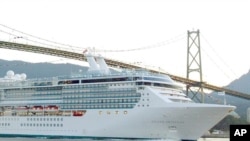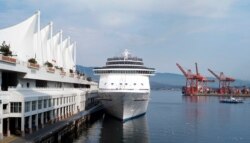Canada’s cancellation of the 2021 Alaska cruise ship season due to the coronavirus pandemic has angered the U.S. state’s politicians and rattled the tourism industry in both countries. Those on the ground in both Alaska and the Canadian province of British Columbia are dealing with the fallout.
Citing continuing concerns over the COVID-19 pandemic, the Canadian Transportation Ministry has extended the prohibition of any passenger cruise vessels carrying over 100 people between Canada and Alaska. The order extends through February 2022.
In a terse statement, Alaska’s U.S. congressional delegation complained that the decision was made arbitrarily by Canada with no consultation or advance notice. The statement, from the two U.S. senators and the state’s only representative, also says it was made without any consideration for Alaska or the state's economy.
According to the Alaska Travel Industry Association, in 2019 the state welcomed more than 1.3 million visitors who arrived on cruise ships, comprising 60 percent of the state’s summer visitors.
The association’s CEO, Sarah Leonard, is urging a temporary waiver to the U.S. Passenger Vessel Services Act to allow cruise ships to sail from American ports, like Seattle, directly to Alaska. Adopted in 1886, the act still prohibits cruise ships from sailing directly between American ports, forcing Alaska-bound vessels to either start from or stop in Canada.
“We've long advocated since the beginning of the pandemic for a potential temporary waiver of that federal legislation, which would again potentially allow large ship cruise passengers or large ship cruise operations to travel to Alaska," she said.
Vancouver, British Columbia, is the principal starting point for most cruise ships heading to ports of call in Alaska, with nearby Seattle providing competition. According to the Port of Vancouver, 2019 was a record-breaking year with more than 288 cruise ship visits, a 22 percent increase from the previous year.
Walt Judas is the CEO of the Tourism Industry Association of British Columbia.
He is concerned a temporary waiver to the Passenger Vessel Services Act might become permanent to the detriment of British Columbia’s tourism industry.
"Once you set a precedent like that, even if only on a temporary basis, who's to stop a lobby from making that permanent? And so that would be a big concern, if you start to sail from, say, Alaska to Seattle, and vice versa, and you cut out the Canadian ports. Now, you've lost a huge amount of business for the visitor economy. And for the economy. In general, we're talking more than $2 billion [Canadian] in economic impact," said Judas.
The Vancouver Convention and Visitors Bureau estimates each ship’s visit brings at least $2.2 million in economic benefits, including Vancouver hotel bookings before and after cruises.
Judas is still hoping, with enough pressure on the Canadian government and positive development in the fight against the coronavirus pandemic, that there might be a way to salvage at least a portion of the cruise ship season this year.








